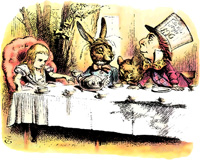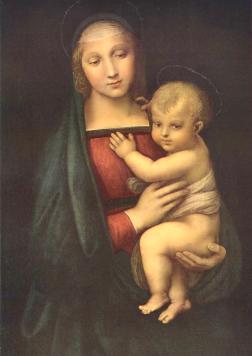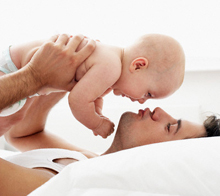
~ About Mary ~ by Deborah Beach Giordano
A Bit of History
 When my father was in the Navy he was stationed in California, and that is why he and my mother decided to make it their home. They had both had quite enough of midwest winters — so different from the warm December sunshine and picnics on the beach they enjoyed here on the West coast. (As my dad never tired of saying, “Ohio is a great place ... to be from.”)
When my father was in the Navy he was stationed in California, and that is why he and my mother decided to make it their home. They had both had quite enough of midwest winters — so different from the warm December sunshine and picnics on the beach they enjoyed here on the West coast. (As my dad never tired of saying, “Ohio is a great place ... to be from.”)
And so I was born into a “long-distance family”; my grandparents and all of the extended kin lived over two thousand miles away. My parents kept in regular contact with “the folks” — including annual visits which always seemed to coincide with the very hottest and muggiest weeks of the year. (The first time I was in a sauna, I said, “This is just like Ohio!”) We wrote letters back and forth, made frequent phone calls, and exchanged gifts at Christmas and on birthdays. My grandmothers were both nice ladies who treated me kindly.
 But it wasn’t like having a real grandmother. A real grandmother was like Susan’s; who lived only a few streets away from her family, kept an apparently endless supply of ginger snaps and brownies on hand, owned a cat named Sal and a parakeet named Sweetie, and took her granddaughter to the movies and to Capwell’s for lunch, and thought Susan was absolutely the best and brightest child who ever lived.
But it wasn’t like having a real grandmother. A real grandmother was like Susan’s; who lived only a few streets away from her family, kept an apparently endless supply of ginger snaps and brownies on hand, owned a cat named Sal and a parakeet named Sweetie, and took her granddaughter to the movies and to Capwell’s for lunch, and thought Susan was absolutely the best and brightest child who ever lived.
That’s the kind of grandmother I wanted. A close-by grandmother to talk to whenever you wanted; who was interested in what you had to say, and had lots of time to listen, who was always glad to see you, who overlooked your shortcomings, was patient, forgiving, welcoming ... and didn’t scold you if you didn’t eat your broccoli.
I envied Susan. I wish that I had been born into a family where I could have had that kind of relationship with my grandmother.
Still Wishing
As a Protestant, that’s kind of how I feel about Mary.
I envy the relationship my Roman and Orthodox Catholic cousins have with the Blessed Virgin. For them she is as familiar — and perhaps more approachable, than her holy Son. They know Mary as our Mediatrix; the Intercessor who will plead our case before God when all other hope has vanished. Her experience as a mother, as one who has known both great joy and great suffering, makes Mary the Lady of Sorrows and the Lady of Good Hope. Mary is one who understands the complexities of human existence; who is compassionate, caring, and sympathetic.
And they can talk to her whenever they want.
That seems quite unfair, to me. I think we all deserve to get to know the amazing woman whose “yes,” transformed our world.
More History
 For the first 1400 years of our faith all Christians had a relationship with Mary; everyone knew the story of her life, felt her joys and her sadness as their own, and welcomed her model of Christian witness as a pattern for their own lives.
For the first 1400 years of our faith all Christians had a relationship with Mary; everyone knew the story of her life, felt her joys and her sadness as their own, and welcomed her model of Christian witness as a pattern for their own lives.
The most zealous of the Reformers pushed Jesus’ mother out of the church — excluding her from worship and the liturgy along with the rest of the things they considered “Popish” and “unnecessary to our salvation.” Sadly, they apparently never paused to think that God considered Mary quite necessary to our salvation — even sending a special messenger along in order to secure her help in the matter.
It was she who brought the Lord Christ into our world. She was the one who protected him, nurtured him, and loved him. Mary was the one who fed and cuddled the baby Jesus, changed his diapers and tickled his tummy. She rejoiced when the toddler took his first steps, she kissed his scraped knees, and taught him how to eat solid foods and how to drink from a cup.
And that was only the beginning.
Why She Matters
Setting Mary aside comes at a cost to our own spiritual life and growth. When we ignore her work as “the first Christian believer” we miss seeing how necessary her actions, how courageous her ministry, and how essential the Woman’s Touch is in the story of our redemption.
 This is not to say that only females can be nurturing and compassionate — no thinking person believes that to be the case. Nor are all (biological) mothers “real mothers,” who follow the Way of caring and safe-keeping. And not all “real mothers” are biological mothers.
This is not to say that only females can be nurturing and compassionate — no thinking person believes that to be the case. Nor are all (biological) mothers “real mothers,” who follow the Way of caring and safe-keeping. And not all “real mothers” are biological mothers.
But we must not only recognize but truly honor the importance — the essential, critical importance — of love and care-giving as a ministry. As Mary’s life so clearly demonstrates, the first and foremost task of a Christian is to be loving, compassionate, gentle, and kind. We are called to shelter the defenseless, to feed the hungry, to bless the little ones — and not only the “little ones” to whom we have given birth. As Mary’s precious Son declared, “as you do to the least of these ... you do to Me.”
We cannot have the Christ Child without his Mother. We would not have the adult Jesus if Mary had not done “all that God had required of her.” And we will be impoverished as Christians if we try to live our faith without the Blessed Virgin’s example.
And We Can Do Likewise

To outside observers Mary’s life was neither noteworthy or unusual; she was just another woman: a mother who raised her child with loving care and affection. But that was enough to change the world. One woman who trusted God with all her heart and soul and mind and strength brought the Lord Christ into our world.
If we are faithful we, too, can give birth to Christ — in acts of mercy and forgiveness, kindness and compassion.
Let the Light shine!Virtual hugs and real-time blessings,
Deborah +
This Week's Spiritual Exercise
In what way can you “give birth to Christ” in your daily life?